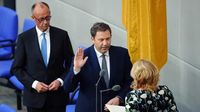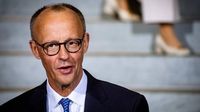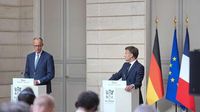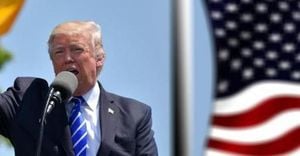Friedrich Merz was elected as the new Federal Chancellor of Germany on May 7, 2025, after a dramatic and unprecedented chancellorship election that unfolded in two ballots. Initially, in the first round, Merz received only 310 votes, falling short of the required 316 votes needed for a majority in the Bundestag. This failure marked a historic moment, as it was the first time a designated chancellor had been defeated in a Bundestag election following successful coalition negotiations.
The political atmosphere was tense, with the failure of the first vote prompting extensive negotiations between the coalition parties, the Christian Democrats (CDU) and the Social Democrats (SPD), along with support from the Greens and the Left Party. These discussions were crucial for setting up a second vote on the same day, which required a two-thirds majority to shorten the waiting period. The urgency of the situation was underscored by remarks from Jens Spahn, the new head of the Union faction, who emphasized that “the whole of Europe, perhaps even the whole world, is watching this second ballot.”
After hours of deliberation, Merz succeeded in the second ballot with 325 votes, officially becoming the tenth Chancellor of the Federal Republic of Germany. His election was celebrated in the Bundestag, where all members stood in applause except for those from the far-right Alternative for Germany (AfD). Following his election, he received the certificate of appointment from Federal President Frank-Walter Steinmeier at Schloss Bellevue, marking the formal transfer of power.
In his first address as Chancellor, Merz expressed gratitude and highlighted the importance of unity within the coalition. He stated, “It was an honest day in the Bundestag,” reflecting on the challenges faced during the election process. His cabinet, which includes 18 ministers, was sworn in shortly after, signaling the start of a new government era.
However, the day was not without its controversies. Just hours after his election, tensions emerged within the coalition regarding migration policy. Thorsten Frei, the Chancellor's Office Minister, announced plans to intensify border controls and reject asylum seekers at the German border, a move that drew criticism from SPD officials who insisted that asylum applications must be processed according to the constitution. This disagreement hinted at potential conflicts within the newly formed coalition.
In the wake of his election, Merz traveled to Paris for his first official trip as Chancellor, where he met with French President Emmanuel Macron. During a joint press conference, Merz emphasized the need for stronger cooperation in defense policy, stating, “We will take joint measures to further expand Europe’s security and defense capabilities.” He also announced a new “three plus three” format for discussing defense issues with France, indicating a commitment to strengthening the Franco-German relationship.
Merz also addressed the ongoing conflict in Ukraine, assuring that Germany would continue to support Ukraine in its fight against Russian aggression. He remarked, “Ukraine can continue to count on Germany’s support,” reinforcing Germany’s role in European security matters.
As the dust settled from the election, some voices within the political landscape expressed concerns about the implications of the failed first ballot. Stephan Weil, the Minister-President of Lower Saxony, described the situation as a “burden for our democracy,” highlighting the fragility of political stability in Germany. Meanwhile, Mathias Middelberg from the CDU interpreted the missing votes in the first round as a “note of caution” for Merz, suggesting that dissatisfaction among party members over cabinet positions may have influenced their votes.
In contrast, former SPD leader Kurt Beck expressed optimism that the coalition would demonstrate unity moving forward, despite the turbulence surrounding the election. He believed that the real work of governance would overshadow the initial setbacks.
As the new government begins its term, Merz faces significant challenges, including the need to navigate internal coalition disagreements and address pressing issues such as migration and defense policy. The coming weeks and months will be critical in determining the stability and effectiveness of this new administration.
In a broader context, the election of Friedrich Merz comes at a time of heightened political sensitivity in Germany and Europe. The new Chancellor's ability to foster cooperation within his coalition and with other political entities will be essential as he seeks to implement his agenda and restore public confidence in the government.






